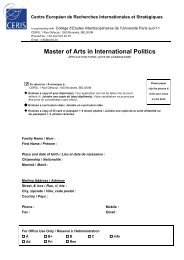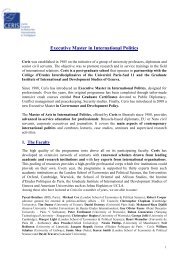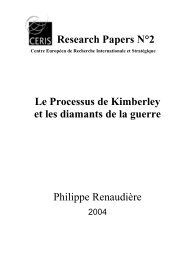hydropolitics of the tigris - euphrates river basin with - ceris.be
hydropolitics of the tigris - euphrates river basin with - ceris.be
hydropolitics of the tigris - euphrates river basin with - ceris.be
Create successful ePaper yourself
Turn your PDF publications into a flip-book with our unique Google optimized e-Paper software.
Conclusions<br />
Historically <strong>the</strong>re were few disputes about <strong>the</strong> management <strong>of</strong> <strong>the</strong> Tigris-Euphrates <strong>river</strong> <strong>basin</strong> until after<br />
WWII. This coincided <strong>with</strong> <strong>the</strong> autonomy <strong>of</strong> <strong>the</strong> 3 main countries in <strong>the</strong> <strong>river</strong> <strong>basin</strong> (Turkey, Syria and Iraq)<br />
and an extraordinary leap forward in development <strong>of</strong> agricultural expansion, irrigation projects,<br />
industrialization and use <strong>of</strong> hydro for electrical power. The majority <strong>of</strong> <strong>the</strong>se initiatives required <strong>the</strong><br />
construction <strong>of</strong> dams and canals for transporting water from <strong>river</strong>s and ‘lakes’ to arid zones or, as is <strong>the</strong> case<br />
in sou<strong>the</strong>rn Iraq, away from inundated or water-logged zones.<br />
Each country has a different focus on development strategy and <strong>the</strong>refore have different requirements from<br />
<strong>the</strong> domain <strong>of</strong> water resources.<br />
Turkey, who has opted for industrialization in South East Anatolia, primarily uses water to provide electrical<br />
power to support its drive to industrialize itself and to reduce costly dependency on importing energy in <strong>the</strong><br />
form <strong>of</strong> petroleum. A good portion <strong>of</strong> <strong>the</strong> stored water from <strong>the</strong> GAP project will certainly <strong>be</strong> used to expand<br />
irrigation areas to immediately raise agricultural economic activity at <strong>the</strong> local level. In addition Turkey has<br />
installed water facilities along <strong>the</strong> Mediterranean coast (such as on <strong>the</strong> Manavgat River) to <strong>be</strong>gin processing<br />
water for export. Preliminary activities have <strong>be</strong>gun <strong>with</strong> North Cyprus and a deal has <strong>be</strong>en recently signed<br />
<strong>with</strong> Israel. Turkey has announced its interest to increase this service to all countries in <strong>the</strong> region. The dams,<br />
especially <strong>the</strong> GAP project, reduce <strong>the</strong> flow downstream but Turkey argues that she has sovereign rights to<br />
<strong>the</strong> water that flows in her territory. Although Turkey does not suffer from downstream management <strong>of</strong> her<br />
waters, she has <strong>be</strong>en affected by downstream complaints have strongly impacted on International funding for<br />
GAP.<br />
Syria, in pursuit <strong>of</strong> a strategy <strong>of</strong> independent food security linked to agriculture, has set about organizing her<br />
water resources accordingly <strong>with</strong> dams along <strong>the</strong> Euphrates and extensive abstraction along <strong>the</strong> Orontes<br />
River. Poor design and planning have resulted in inefficiency <strong>of</strong> <strong>the</strong> Syrian hydrological program, <strong>with</strong> <strong>the</strong><br />
result that she is now a net importer <strong>of</strong> food and sometime receiver <strong>of</strong> food aid. There is a need to adjust<br />
economic plans and strategies and develop <strong>the</strong>ir industrial capacity to try to escape this dependency. Syria<br />
will have some difficulty, <strong>be</strong>ing a state <strong>with</strong> underdeveloped industrial capacity and limited energy reserves<br />
(petroleum and hydroelectricity). This change will require an adjustment in human resources (skills, training<br />
34





